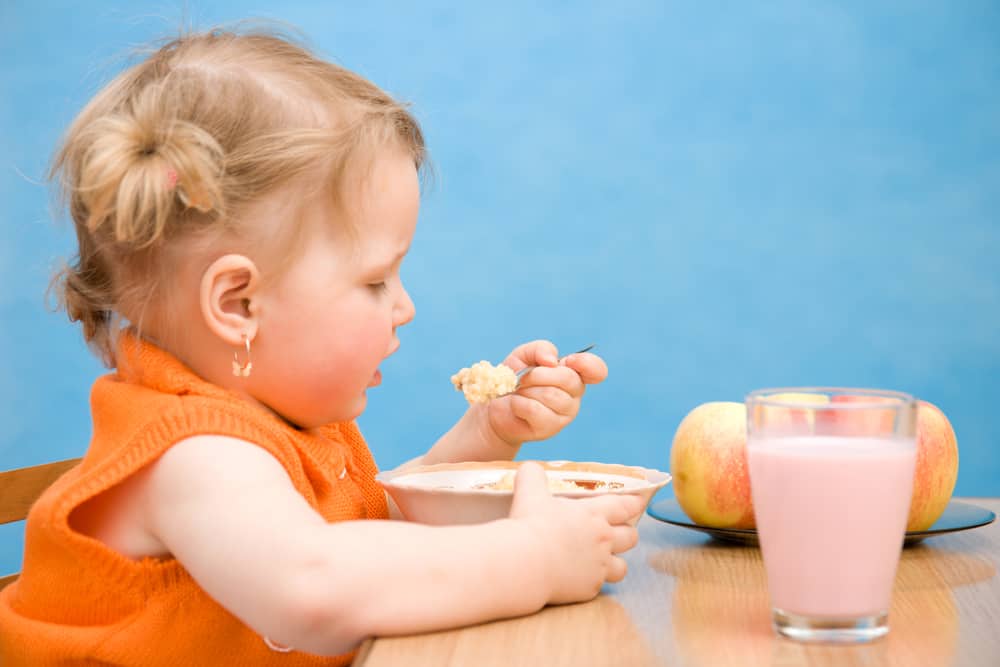Is your baby starting to eat solid foods? When your pediatrician says that your baby is ready (generally around six months), you can begin to introduce “grown-up” food to your little one.
Breakfast is adults’ most important meal of the day, and the same holds true for babies. The food your baby eats first thing in the morning should replenish the calories he’s burned overnight and jumpstart his metabolism for the day. Try to include some protein, some carbohydrates, and some nutrient-rich fruits and vegetables in your baby’s first meal of the day.
Here are 15 healthy breakfast ideas for babies who are beginning to eat solids. (Make sure you check with your pediatrician about eggs, cow’s milk, and cheese to ensure your baby is ready for these).
Spoon-Fed Foods
Babies can eat and digest “mushy” food quickly, but you’ll have to feed these foods to your baby with a spoon until she learns to handle eating utensils.
1. Oatmeal or porridge
Oatmeal is a spoon-fed favorite for both babies and moms. If you’re making oatmeal from scratch, grind up the oats with a food processor before cooking to make the oatmeal easier for your baby to digest. Top the oatmeal with applesauce or chopped fruit to make it tastier.
2. Porridge
Porridge can be made from various grains, including rice (whole grains, flakes, or flour), barley flour, sago pearls/sabudana, or ragi. Once you’ve cooked the porridge, add some fruit to give it flavor and extra nutrients.
Mashed ripe pear, mashed mango, mashed banana, or unsweetened stewed apples are all great choices. Try adding a little cinnamon or ground cloves for flavor variety.
3. Vegetable Purees
If your baby likes purees, you can make many great breakfasts in your blender or food processor. Ensure you have a blender that can handle hot foods and liquids unless you plan to let your vegetables cool before pureeing them. (The Vitamix 5200 Pro is an excellent example of a blender that can handle hot and cold foods.)
To make a vegetable puree, chop and then steam or boil your choice of vegetable until soft. Put the cooked vegetable in your blender and puree it, adding a small amount of the cooking water until the puree reaches the desired consistency.
For a thicker texture and more nutrition, add some cooked rice to the mixture and puree it more in the blender. Cool the puree to a safe temperature and give your baby a serving as part of a balanced breakfast.
Tip: freeze the remaining puree in an ice cube tray for handy individual servings you can thaw one or two at a time.
4. Vegetable puree with meat
Once your pediatrician has okayed meat for your baby, you can add some small pieces of cooked meat to the blender with your vegetable puree. Be sure to select parts of meat that don’t have any bone or tough gristle.
5. Mashed vegetables
When your baby can handle a chunkier texture, you can switch from pureeing vegetables to mashing them with a fork or a potato masher. Root vegetables mash particularly well – try carrots, sweet potatoes, yams, parsnips, turnips, or rutabagas. For added sweetness, mash in some cooked apple with any of these root vegetables.
6. Dairy
Plain, unsweetened yogurt is a healthy spoon-fed choice for your baby, and so is plain cottage cheese. Add mashed or sliced fruit to make it more exciting and tasty.
Finger Foods
Your baby will enjoy experiencing different textures and flavors as he starts to eat solid food. Giving your baby food items he can pick up in his fingers is a great way to help him practice fine motor skills, so don’t limit yourself to spoon-fed meals!
1. Toast strips
Try toast strips for breakfast food that your baby can pick up easily. There’s no need to put anything on the toast strips, as most babies like plain toast just the way it is.
2. Pita bread and hummus
Cut a piece of pita bread into manageable pieces for your baby. Dip the pita bread in hummus for some added flavor and protein.
3. Fruit chunks
Chunks of fruit work well as finger food, although they can be slippery when your baby is first learning to pick them up. Try leaving the skin on the part of a banana chunk to make it easier to pick up. Your baby will figure out quickly that the skin is not the tasty part.
4. Peanut butter
As long as your child doesn’t have a nut allergy, peanut butter is an excellent source of protein. Dip chunks of fruit or bread in peanut butter to make your baby’s breakfast more delicious and nutritious.
5. Hard-boiled eggs
For a good source of protein, try a hard-boiled egg cut into manageable pieces. For less mess, give him just the whites of the egg.
6. Scrambled eggs
Scrambled eggs are soft, easy finger food, too (make sure the eggs are cool enough for your baby to touch before you give them to her). You can add some veggies while cooking the scrambled eggs for extra nutrition.
7. Cooked whole vegetables
Cooked whole vegetables are tasty and fun! Try cooking string beans, snap peas, baby carrots, or broccoli pieces and giving them to your baby once they’re cool enough to handle.
8. Baked goods
Baked goods made with healthy grains and not much sugar can be good choices, too. Whole grain pancakes, multigrain muffins, egg and veggie frittatas, and sweet potato hash browns can all be given to your baby as delicious, healthy breakfast items.
9. Soups or stews
Most soups or stews you make for yourself can also be given to your baby, although you should pass anything with large chunks through the blender first. Transforming last night’s leftovers into this morning’s baby breakfast is a great time-saver!
Like adults, babies appreciate variety. Give your baby lots of different foods for breakfast (and other meals) to keep her interested and to ensure that she gets complete, balanced nutrition.




